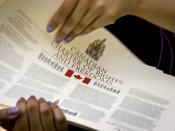"Whose life is it, anyways?" Life itself is complicated but allowing people to die by assistance is far more complex. Euthanasia is still a controversial issue in North American society, in particular Canada. Euthanasia comes from the Greek word euthantos literally meaning "well death." In modern English, it is defined as "bringing about of a gentle death in the case of incurable and painful disease." There are two basic types of euthanasia: active and passive. Active euthanasia is the commission of act (i.e. example lethal injection). Passive euthanasia is the opposite whereby medical care is withheld from the patient (also know as omission). Although there is a positive movement for euthanasia, it is still something more than "the quality of life". It is as the Christian doctrine states "the sanctity of life". It is true that the Canadian Charter of Rights gives us the right of liberty and allowing someone to suffer a terminal illness can be considered "cruel and unusual punishment".
However, this is overlooking the obvious. Euthanasia is considered morally wrong and because of the legal, ethical and social impact it has in our society, it should never be legalized.
The law is there to protect citizens so legalizing euthanasia would defeat its purpose. Physician- assisted suicide is too close to murder and has so far been prohibited by the Criminal Code of Canada.
"14. No person is entitled to consent to have death inflicted on him, and such consent does not affect the criminal responsibility of any person by whom death may be inflicted on the person by whom consent is given.
"241. Everyone who counsels a person to commit suicide or aids or abets a person to commit suicide, whether suicide ensues or not, is guilty of an indictable offence and liable to imprisonment for...


